Welcome to another issue of The Newport Cornucopia where we dig through the newspapers archives for interesting news articles and adverts. All articles are posted verbatim and most headlines are original (headlines in quotes are my own).

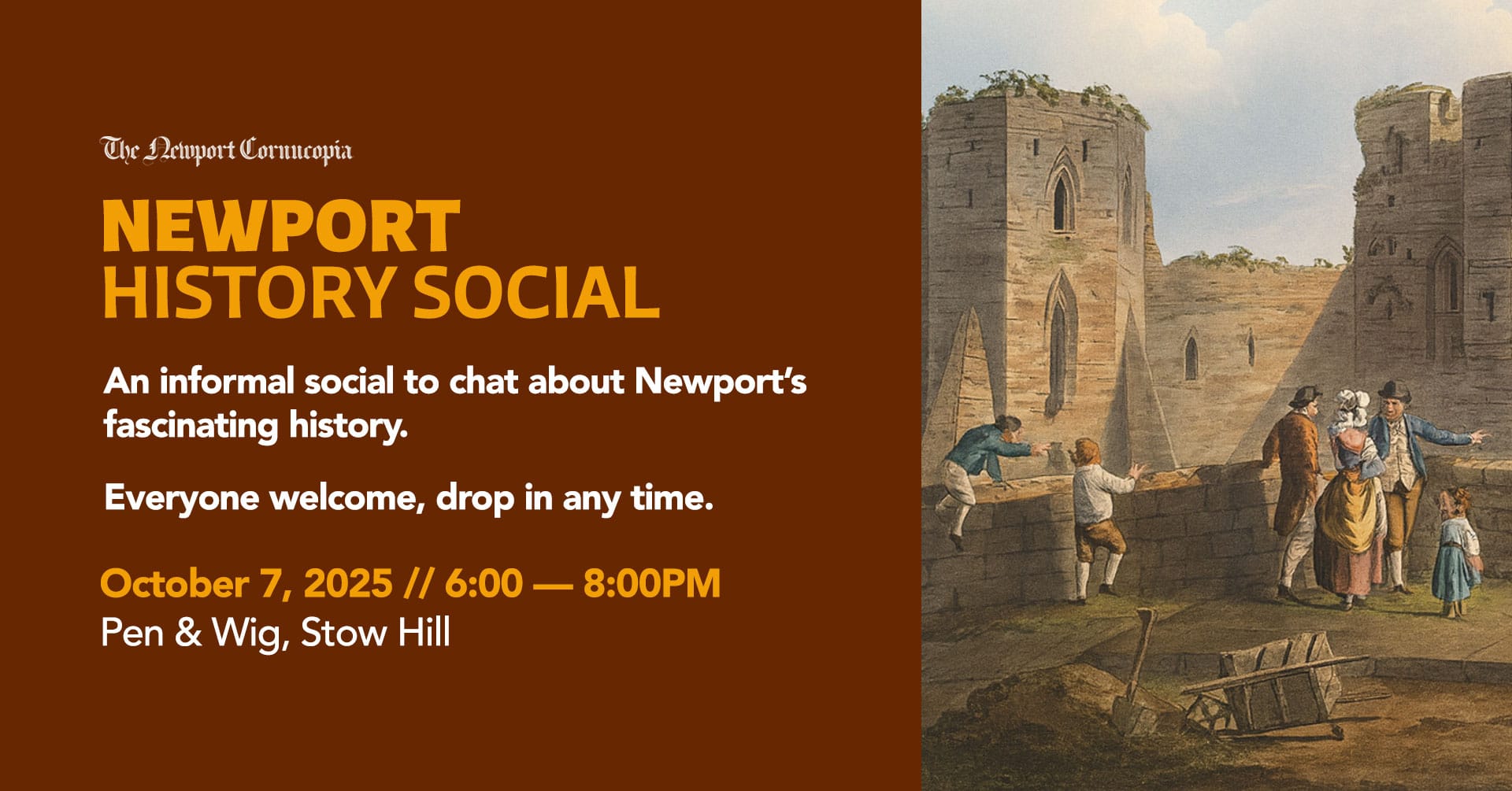

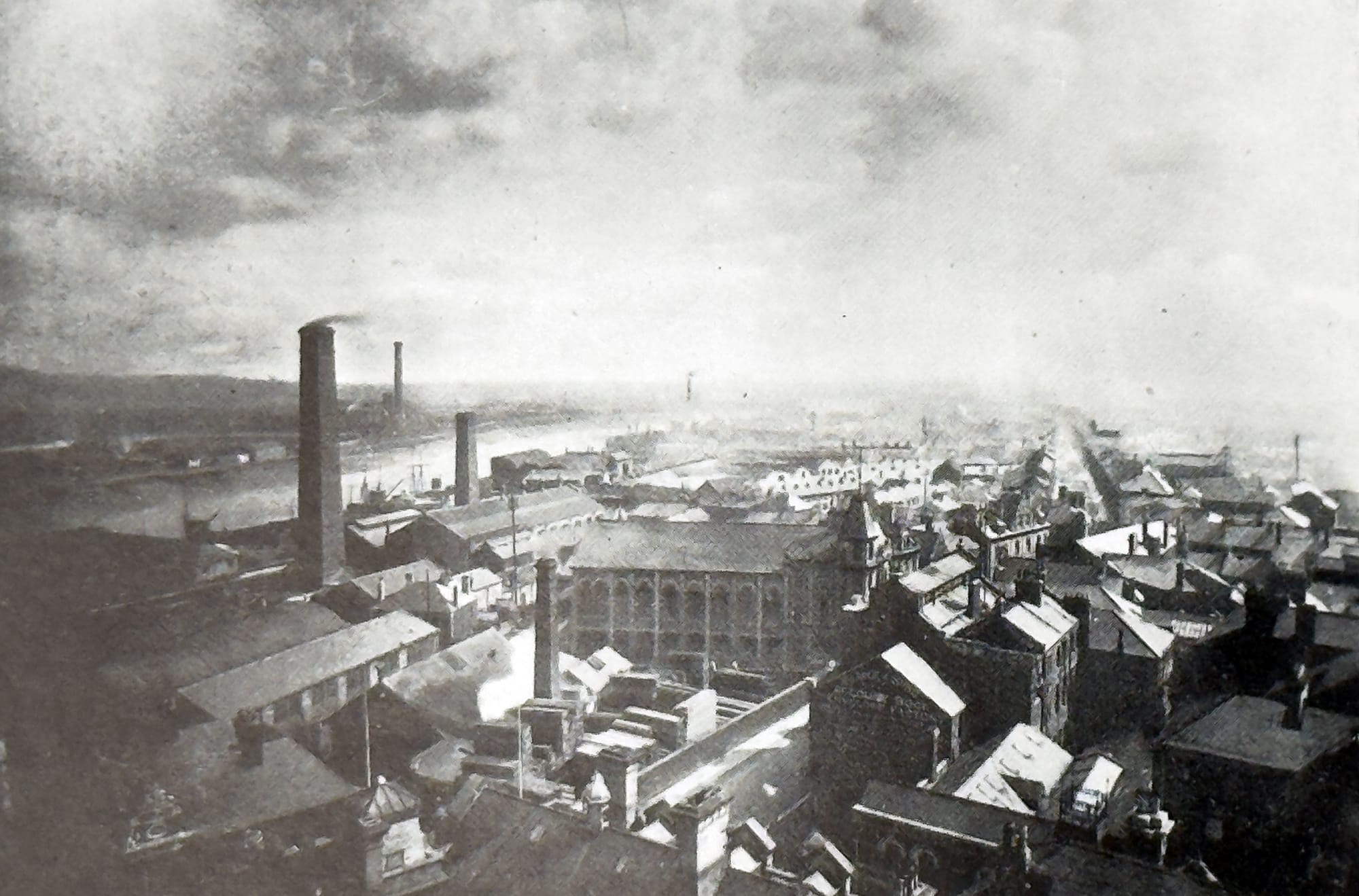

Gallant Otter Capture
On Wednesday last, as a man mowing in a field adjoining Malpas Brook, in this neighbourhood, he observed a large otter, making his way to the water. A dog, of the fox-terrier breed, who was with the man, instantly dashed at the varmint, and a desperate battle ensued, which continued for a considerable time, with various vicissitudes, the otter being heavier and more powerful than the dog; the struggle seemed doubtful, the former endeavouring to drag the latter into deeper water, where he would inevitably have been drowned, but the dog gamely kept his hold, although very severely bitten, and the man, seeing that affairs were more than doubly hazardous, timely came to the assistance of his faithful and courageous companion, and between both, the enemy was put hors de combat.
The slain proved to be a dog otter, weighing nearly 27lbs. We believe this to be as gallant a feat for a single dog, as any upon record, when we consider the formidable size of his opponent, and the characteristic fierceness of the otter species.
— Monmouthshire Merlin, 20th June, 1846

'Newport Census, 1831'
Borough of Newport Number of Inhabited Houses, 862 Males, 2415 Females, 2483 Total, 4898. Parish of St. Wollos Number of Inhabited Houses, 394; Males, 1085; Females, 1079; Total, 2164. Total, Borough and Parish, 7062. Total, Borough and Parish, in 1829, 6635 Increase, 427.
— Monmouthshire Merlin, 18th June, 1831

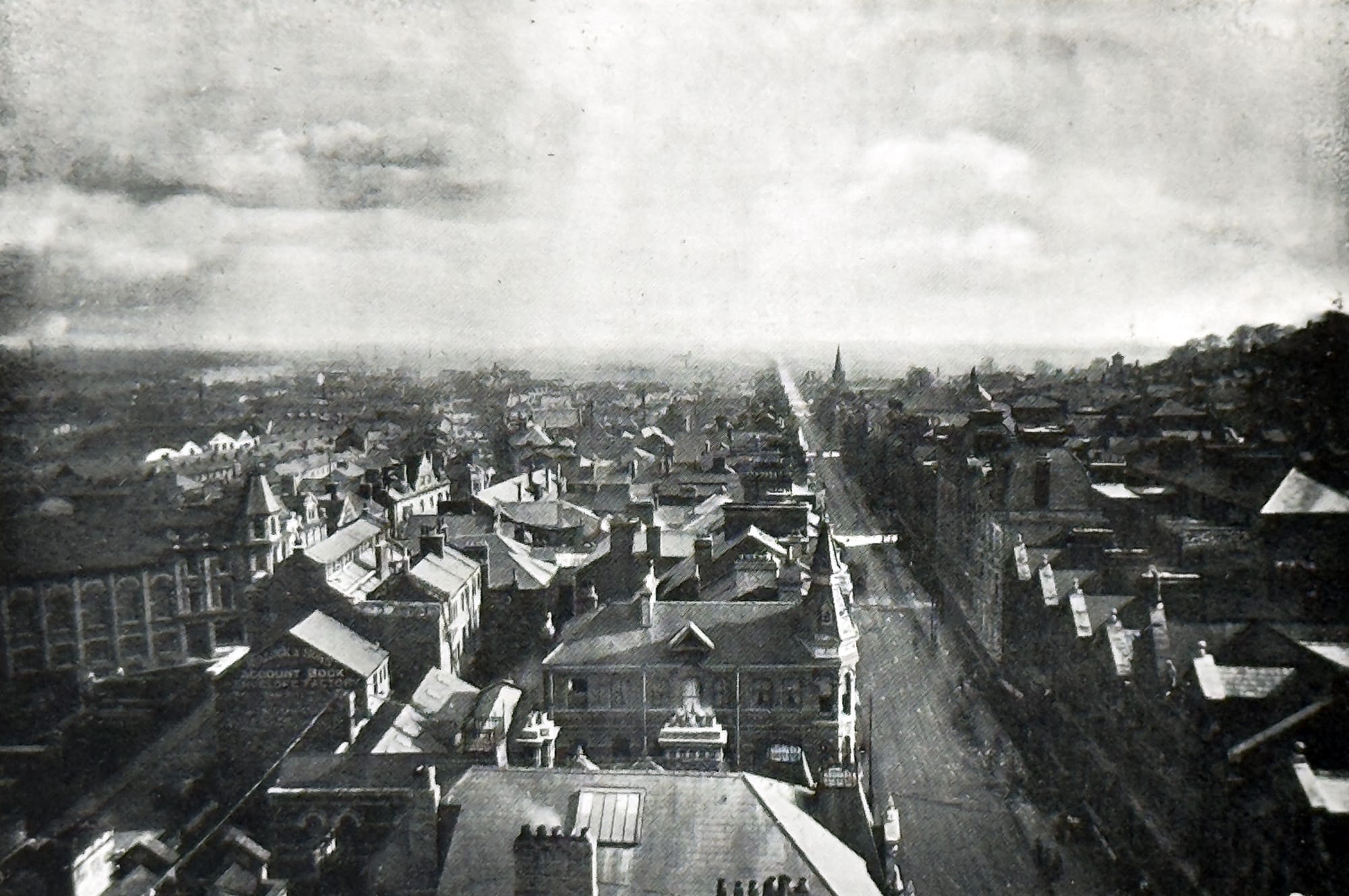

Accident from Intoxication
On Saturday last, a miller named Thomas Preece, aged 50, having a wife and eight children was taken to the Newport union workhouse with a broken leg, which, on being promptly attended to by Mr. Hawkins, surgeon, was speedily so far remedied as to warrant the unfortunate man's restoration to his large family and his business.
We regret to hear that the accident was attributable to intoxication, to which failings however, Preece is not habitually addicted. It appeared that on Friday last, he was proceeding to the mills at Ebbw, for the purpose of receiving money due to him, which he received, and a pint of beer.
Instead of returning to his family, he remained at the [Tredegar] races, where he drank more beer, and towards the close of the day engaged himself in assisting a man to remove a booth from the park. It is supposed this led him to indulge in additional potations of liquor, till he became intoxicated and at night he was found lying across the park coach road, by a gentleman, who at once called the Castletown constable to remove him.
The constable though it was only a drunken affair, and the man was not removed. Subsequently, however, the constable at Bassaleg was called, and he found that the unfortunate man was insensibly drunk, and that his thigh was broken. It was also discovered that some heartless wretch had rifled the poor fellow's pocket of 6s wages, not a farthing of which Preece had spent, a pocket knife, and other articles, and had actually taken his boots from his feet, and carried them off.
It was very fortunate for Preece that he was discovered in his perilous position, as had a horse or carriage gone that way, it is probable he might have received some still more serious injuries, or been killed on the spot. We hope the escape the poor hooest fellow has had from protracted suffering, dissevered limos, or even death, will be sufficient warning to him never again to be so easily overtaken by the old enemy, Drunkenness.
— Monmouthshire Merlin 13th January, 1844

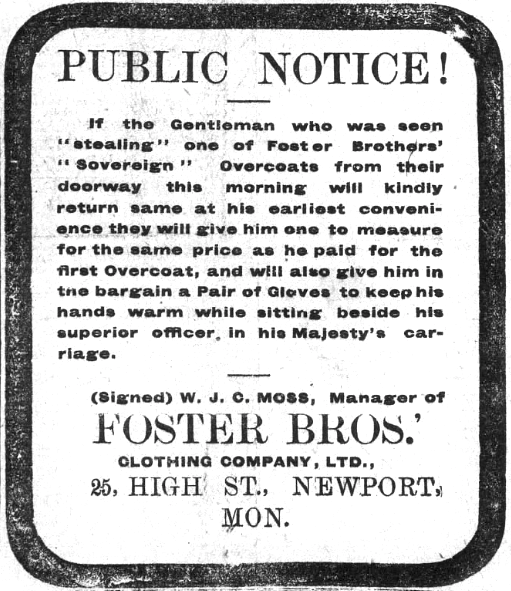

Newport Reading and Coffee Rooms
The commodiously-fitted up coffee-rooms of Mr. Charles Desmond, were opened with a musical soiree, on Tuesday evening last. About fifty gentlemen of the town assembled on the occasion, and spent a happy evening, enjoying truly "the feast of reason and flow of soul," over the infusion of the Indian berry, richly enlivened by music and intellectual conversion, all warmly wishing the popular and spirited proprietor triumphant success in the establishment of this admirable retreat for his temperate and intellectual fellow-townsmen. Mr. Parfitt cleverly presided at the grand piano forte.
— Monmouthshire Merlin, 23rd March, 1844
In addition to be a coffee house, Desmond's Rooms as it was called, also held art fairs.



Hill Street
The nuisances so long staring passengers out of countenance in this street, are being removed and remedied. The Tredegar Wharf Company have contracted with Mr. Moses Scard, and that able reformer of bad roads is now busily employed with a large physical force of improvers. levelling the rugged hillocks, and smoothing the surface of the street, which will shortly present a handsome inclined plane, fit for the Commissioners to adopt.
Once under the guardianship of that careful body, the street will advance rapidly in its pleasing appearance. This Mosaic work is very gratifying to the inhabitants.
— Monmouthshire Merlin, 23rd March, 1844

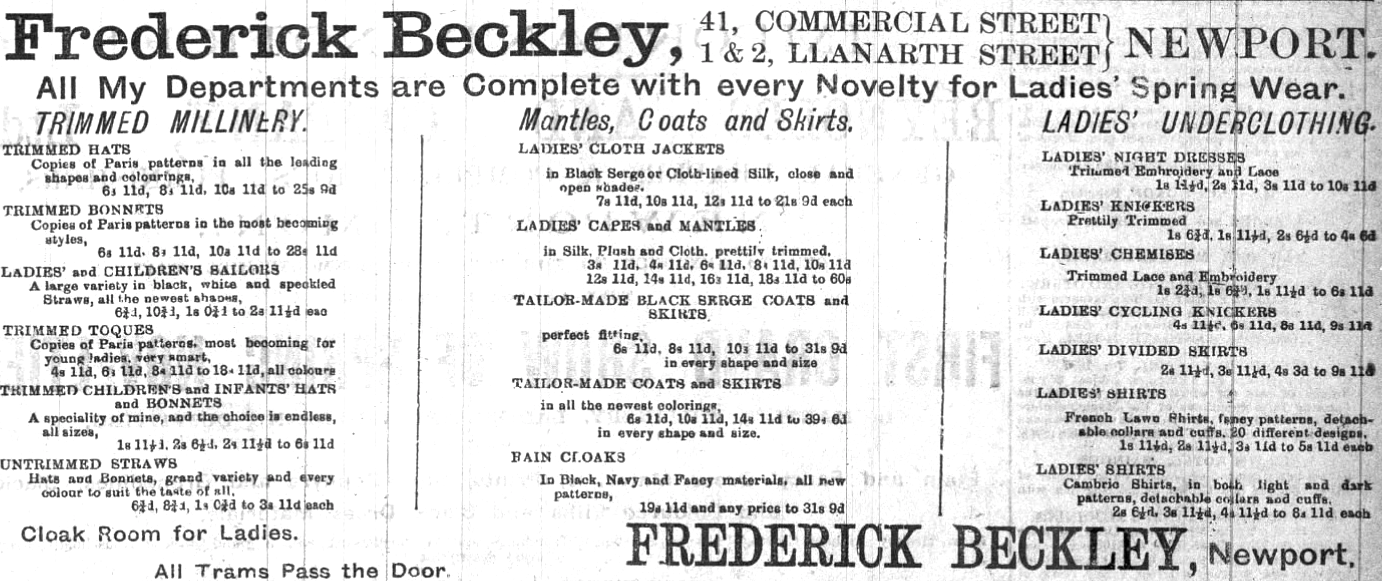

Cupboard Love
A sighing swain was last Saturday night, at a late hour, perceived by a blue-coat-Argus, watching eagerly the back door-way of a house not exceedingly far from the centre of Stow Hill. At length the corpulent cook of the household was observed stealthily to creep out, and after exchanging a fond greeting with the "nice young man," she placed in his keeping a suspicious looking parcel.
The policeman straightway made his appearance, and captured the devoted lovers, when he found the cook's kind pledge of love to consist of some good lumps of beef, some bread, and a "snack" of cheese. The master of the house, being apprized of the discovery, forbearingly refused to prosecute cookey [sic] or her lover.
— Monmouthshire Merlin, 14th September, 1844

Fearful Accident
An incident of a most exciting and alarming nature occurred in Hill street, in this town, on Friday last, the 4th inst. Hill street forms a communication between Victoria Place, out of Stow Hill, and Commercial street, and it is so excessively steep that horses or vehicles of any description, excepting the light donkey carts of green grocers, are seldom or never taken up or down it.
At the back of Victoria Place, are stables, and the road to them is out of Hill street, at its summit, the distance from whence to Commercial street, which crosses at right angles, is about two hundred yards. This was the scene of the circumstances we are about to describe.
At eleven o'clock, on Friday morning, a waggoner arrived in Victoria Place, with a load of hay, about two tons and a half in weight, drawn by three horses, which hay was to be taken to the stables just spoken of; two of the horses were removed, and the dray was put on the near hind wheel the driver then attempted to turn the load into the stable way by means of the wheeler, which, we suppose, was correct enough but, the turn was evidently made too sharply, and the man narrowly escaped being crushed to death against the end of the house, No. 1, Hill street, in collision with which the waggon was brought; but, fortunately, the high over hanging load of hay prevented this.
The horse, a light, active animal, found the weight behind him too much to keep back, and strove in vain to obey the command of his driver, "Whoay"—" Whoay!" The poor animal appeared to exhibit an intelligence, almost actuated by reason, and, certainly showed that he had been well trained for the position he occupied, although unequal on the present occasion, to the fearful emergency which so suddenly presented itself.

The driver, with a desperation that manifested itself in his frequent cries to the animal, bravely clung to the horse's head, and endeavoured to aid him in his strong efforts to stay his progress but, they had now proceeded some forty yards down the hill and every turn of the waggon's wheels accelerated its course, and at length, the man, unable to keep speed with the horse any further, abandoned him to his fate The animal turned his head across the street, and, in all probability, would have entered the new opening, formed near the chapel, into the square behind, but the lamp post on the corner was in his way, to avoid which, he again turned aside, and maintained his course along the centre of the street.
At this point the abrupt steep is considerably reduced, and the animal renewed his efforts to keep back the heavy load at every short and swift bound, striking his fore feet against the earth, as well as forcing back with his haunches. Fearful was the struggle and inevitable the destruction, that too evidently appeared before him, in the line of houses (Commercial street) which crossed the direction in which its steps were now so rapidly impelled.
Onward he came to the paved crossing, men, women, and children, flying terror- stricken before him, his eye-balls wildly glaring, his nostrils distended, and every muscle of the body quivering with unavailing energy, until, with cramped strides, he crossed the street, and dashing his fore feet against the wall of the house opposite, he fell, doubled up under the enormous weight that pressed upon him, the waggon turning, tail upwards, with his lofty load into the air!
Then came a rush of men to rescue, several clinging to the hind wheels of the vehicle, which unfortunately broke off, falling to the ground, and nearly injuring those who clung to them. Several horses were then procured, and a chain was made fast to the hind part of the waggon, to which they were attached, and the rope that bound the hay together, having been cut, the mass was drawn off, at one pull, and the whole scattered about the street.
The poor horse now started upon his feet, and walked off, apparently little injured. The strong wall of the house was riven from top to bottom, but, beyond that, no damage worth mentioning occurred and, altogether, the circumstance is one which no one would have thought could have happened with a result so little injurious to property, and unattended with loss of life.
— Monmouthshire Merlin, 11th June, 1852

'Swallowed a Coin?'
A Welsh dame and her husband came into Newport, and slept a few nights since, at a lodging-house on the Canal-side. The old lady had a sovereign with her, she being purse-bearer; and this, for security's sake, she placed in her mouth when she retired for the night; for, it appeared, she had a suspicion that as the landlady slept in the room, it would not do to put temptation in her way.
The good wife, however, on waking next moraine, found her sovereign gone and in her indignant surprise, she supposed that as she always slept with her mouth open, the landlady had no doubt peeped in, after Somnus had sealed her eyes, and, perceiving the golden booty filched it from its cunningly-devised hiding-place. The landlady denied the accusation. Thereupon the old lady ran to the officers of justice, and complained loudly, demanding that the hostess should be apprehended.
She was persuaded by the officers, however, that it was possible she herself had swallowed the coin, while asleep and snoring: The bare possibility of this being the case. was admitted by the old lady.
— Monmouthshire Merlin, 30th April, 1852

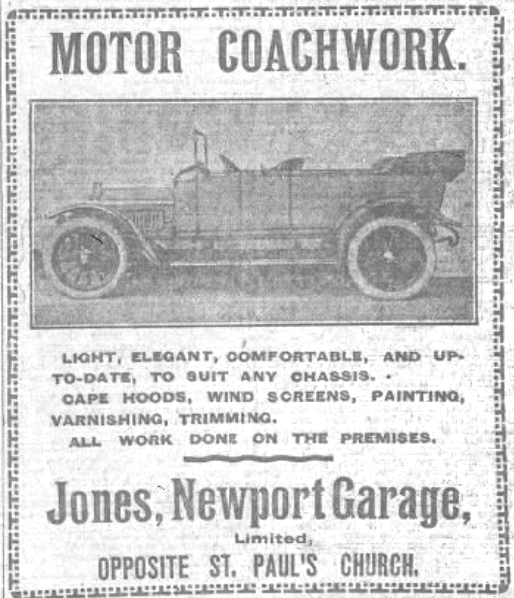


'Light-Fingered Damsels'
Matilda Davies and Sarah Kelly, two young light-fingered damsels fiom the Brislol side of the water, who had come down to pay a prufaesional visit to Llandaff fair on Wbit-monday, were placed at the bar charged with picking the pocket of Mrs Jane Morgan, Stow-hill, of 8s. 61., in the market, on Saturday last.
Desirous, perhaps, of raising supplies as they progressed, these female pickpockets had commenced in the market soon after their arrival hete and although we have not beard that other pockets besides Mrs Morgan's were plundered, it may safely be supposed that had they not been detected in Newport, they would have greatly increased the damage done in their line at Llandaf. The charge was fully made out, and the prisoners were committed to lake their trial at the sessions.
— Monmouthshire Merlin, 4th June 1852
Taking Too Much Care of Himself
Timothy Rearden was charged with being drunk and disorderly, and assaulting several people in Commercial-street, last Saturday evening. Mr. Superintendent English proved finding Tim in an uproarious state, kicking respectable persons, and running a great risk of receiving a sound thrashing for his impertinent and drunken conduct.
— Tim: Why, sure, thin, it was the middicine that did it.
— The Mayor: What, the medicine!
— Tim: Yes, sure, now, it was the middicine I took. I'm an arly riser, and I was sick on Saturday so I called on the doctor, and says he, "Why, thin, Tim, you had better take a couple of glasses of whiskey and a couple of brandy, and then it's all right you'll be from the sickness!" (Laughter.)
—Mayor: And as that medicine did you harm, we will try what another kind of medicine will do for you, we fine you 10s., and 8s. costs, or one month's imprisonment.
— Monmouthshire Merlin, 14th July, 1849
'A Rather Vixenish-Looking Young Wife'
Jane Davies, an interesting, but rather vixenish-looking young wife, with an infant, in its night-clothes, in her arms, was charged with assaulting her husband, John Thomas Davies, letter carrier.
— Wife: I am not guilty he beat me first.
— The Mayor: Can't you settle this matter with your wife, Davies? It will he very discreditable to both of you, to expose your domestic differences in a public court.— Davies: Why no, gentlemen, I can't live with her it's no use to try.
— Wife: And I can't live with him. He came home last Saturday morning in one of his tantrums, and beat me shamefully.
— Husband: Last Saturday morning, at half-past nine, when I went home to breakfast, she threw a cup of coffee at me.
— Wife, sharply: You struck me first—you know you did.
— Husband: When I went in, she began to insult me. She said: Here I'll sit in this "humble cot," and make you maintain me, at six shillings a week.
— Wife: No such thing, you bad fellow; you beat me first; I'll swear it.
— Husband: Oh, you I'll swear anything, and that the gentlemen know well.
— The Mayor: You are both pretty well acquainted with swearing, I think.
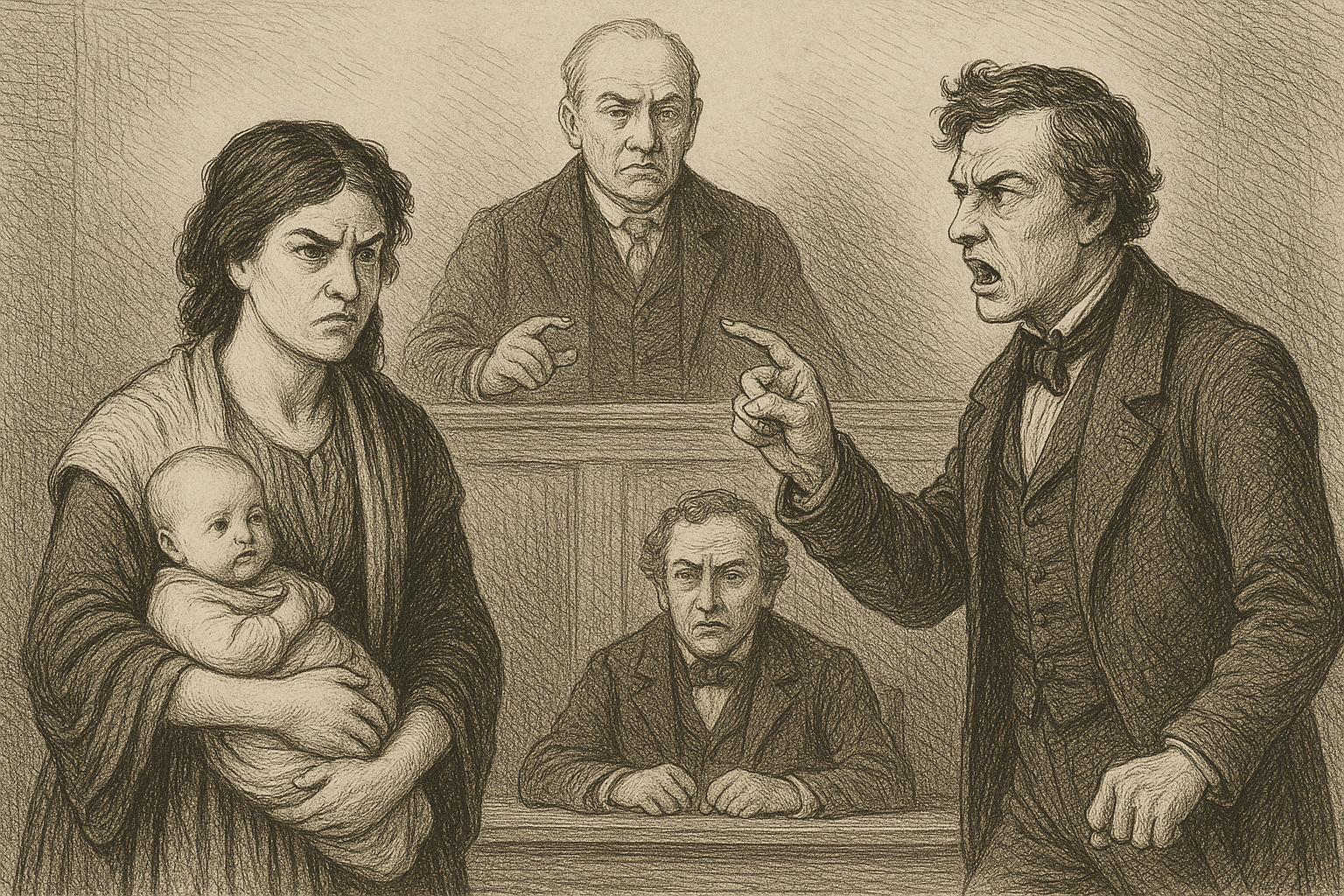
— Husband: She smashed the looking-glass all to pieces. She flung the kettle at me. I've tried her four times, and it's all no use. But she shan't hobble me any longer. No, I won't stand it no longer. I give her every indulgence a man could give a wife; but it's all no good.
— Wife: Oh, you bad fellow; it's no such thing. Here am I and the blessed babby, and you acting as you do.
— Husband: Give her as much drink as she likes, and she will sit down all day, and do nothing, instead of leaving my linen go to rags. Then she left the babby, when it was only a fortnight old—why, the beasts of the field wouldn't do so bad a thing. (Laughter.) Let any gentleman consider w ether he could walk fourteen miles a day, on ten shillings a week. I only get 14s. a week, and can't afford her more than 4s. a-week; but I'll cheerfully give her that, to get rid of such a thing.
Case dismissed, Davies promising to allow the rib (sic) 4s. a-week.
— Monmouthshire Merlin, 14th July, 1849
Mary Funnell, alias Green Boots
Mary Funnell, alias Greten Boots, was brought up charged with stealing a watch, the property of George Garratt, on the night of Wednesday last. It appeared that as Mr. Garratt was proceeding from the house of his brother in George-street, on Wednesday night about twelve o'clock, towards his own residence in Commercial- street, the prisoner accosted him near Mr. Clapperton's shop, and almost immediately snatched the watch from his waistcoat pocket, and secreted it on her person.

Whilst holding her in the hope of seeing a policeman come up, Charles Ellicott, shopman at Mr. Garratts. was returning from the Crown, and fortunately came up at the moment, to whom Mr. Garratt told the circumstances of the robbery. Whilst taxing her with the theft, Ellicot heard the watch falling upon the pavement and stooping down; he picked it up, and a policeman being attracted by the prisoner's outcries, she was taken to the station.
P. C. Huxtable deposed to taking the prisoner into custody, and hearing her beg Mr. Garratt's forgiveness, promising never to commit a similar offence. She was very drunk at the time. Committed for trial at the next Assizes.
— Monmouthshire Merlin, 6th February, 1841

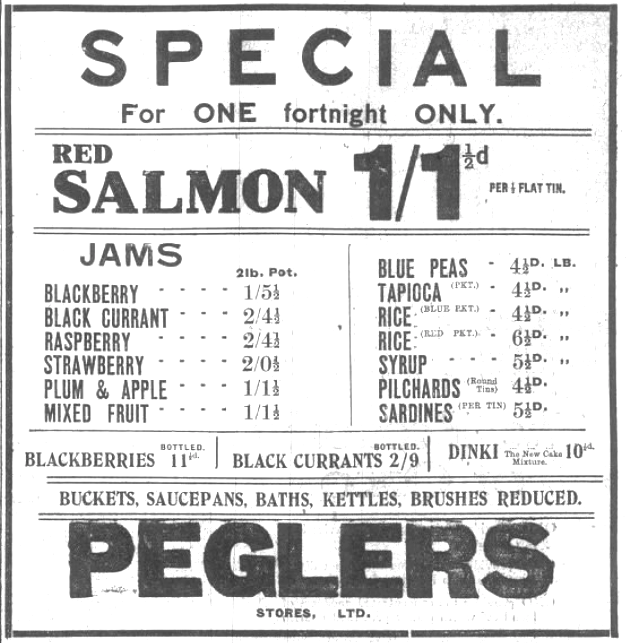

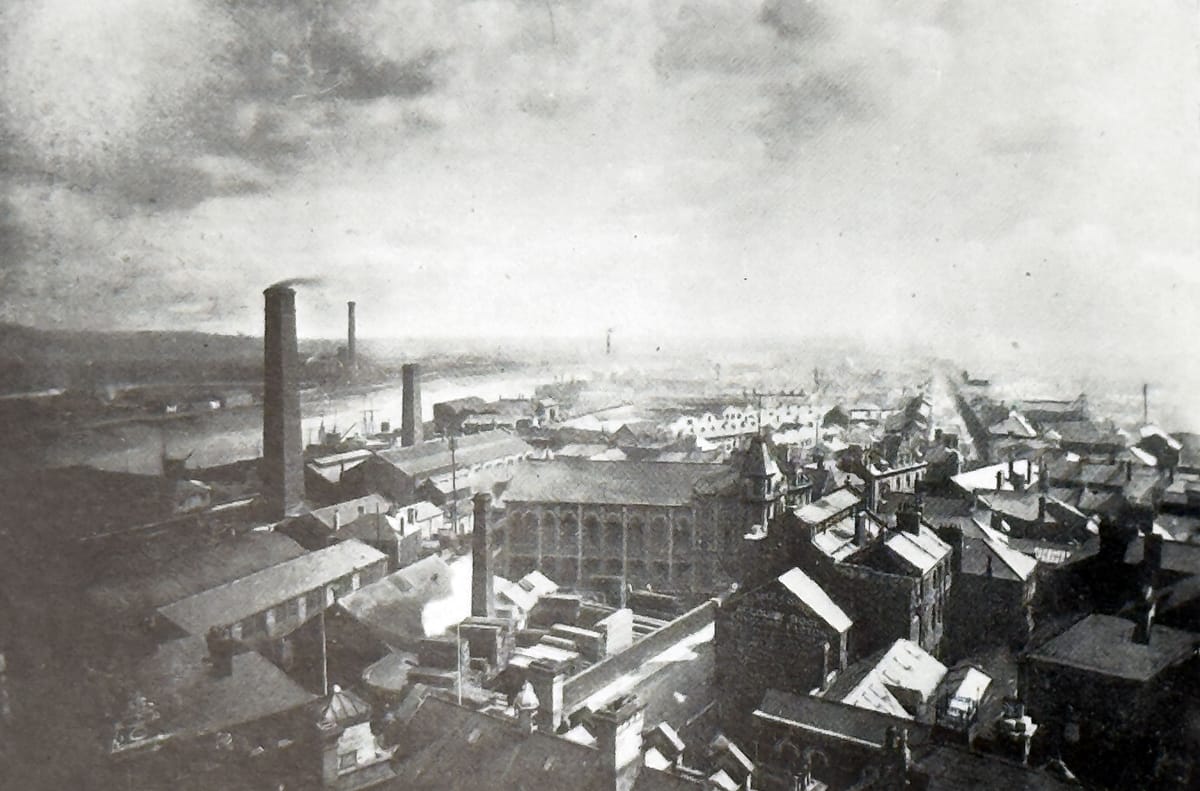
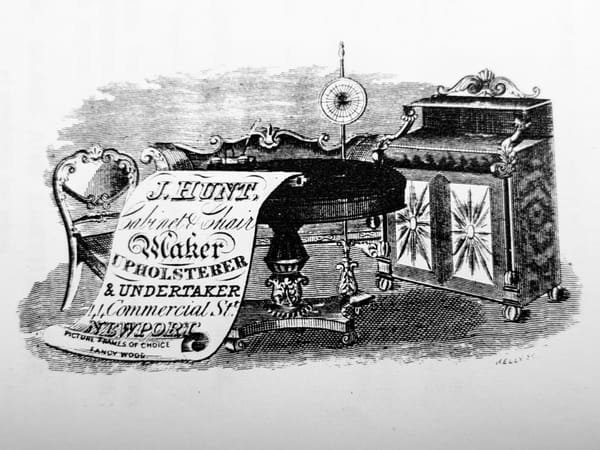
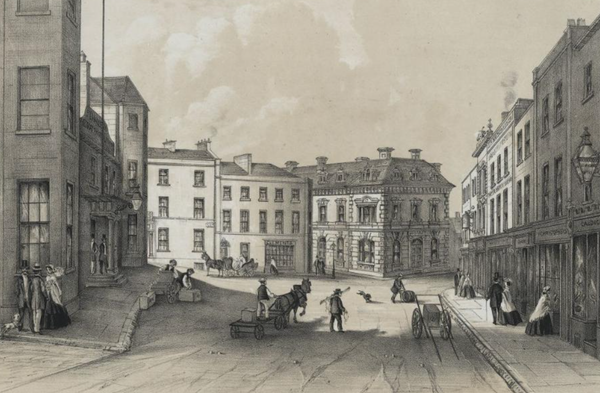
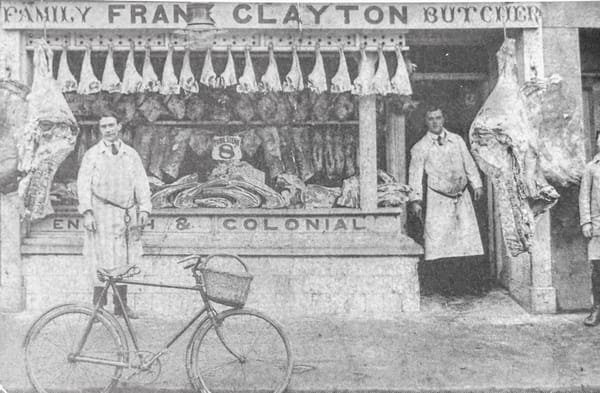
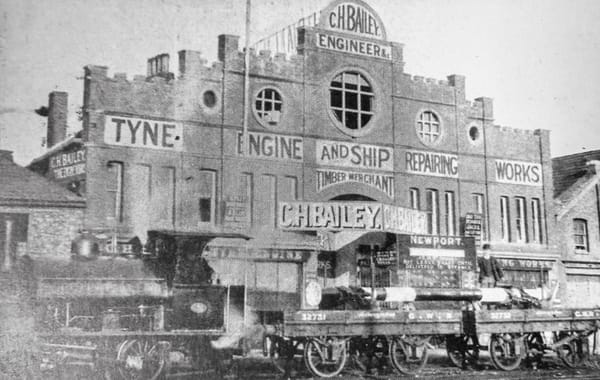

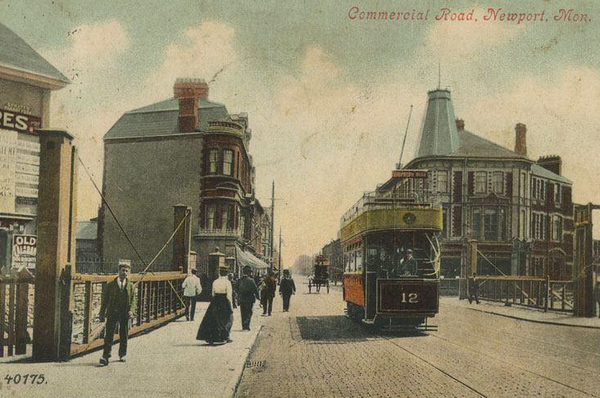
Member discussion